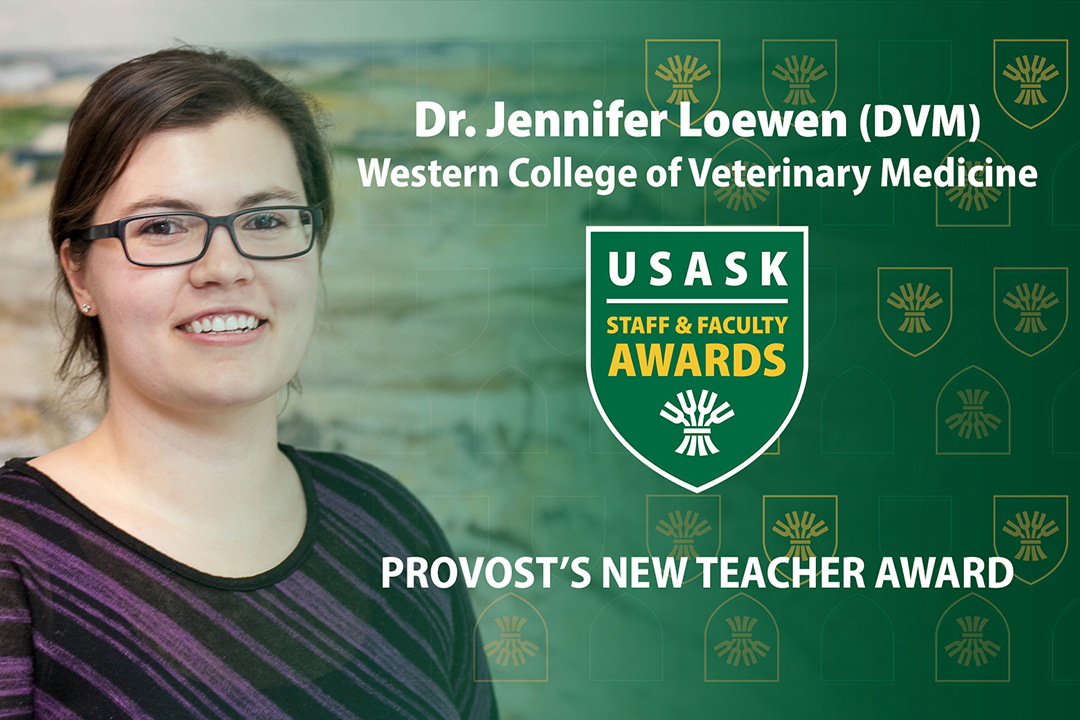
Loewen’s efforts inspire new generation of veterinarians
Much like in human medicine, veterinary emergency and critical care is a busy, high-stakes discipline. Decisions must be made rapidly, and it can be difficult to teach students while working quickly to save lives.
By Jeanette NeufeldDespite the inherent challenges of this learning environment, Dr. Jennifer (Jen) Loewen (DVM), is being recognized with the 2022 Outstanding New Teacher Award at the University of Saskatchewan (USask) for her ability to not just teach but to inspire students.
Originally from Winnipeg, Man., Loewen completed her Doctor of Veterinary Medicine (DVM) degree at the WCVM in 2014. After graduating, she took additional training to become a board-certified veterinary specialist in emergency and critical care at Iowa State University and then the University of Wisconsin-Madison. Loewen became an assistant professor in the Western College of Veterinary Medicine’s (WCVM) Department of Small Animal Clinical Sciences in 2018.
As the sole emergency and critical care specialist at the WCVM’s Veterinary Medical Centre, Loewen supervises and supports senior veterinary students as they train in the hospital. She also teaches part of the third-year small animal medicine and surgery course, and to further develop the college’s emergency program, she created a third-year elective course on emergency medicine and critical care. In addition to teaching veterinary students, Loewen provides support for clinical interns and the team of registered veterinary technologists who work in the emergency service and ICU.
In addition to her dedication to continued education and improving learning, Loewen is being recognized for her work in delivering remote teaching throughout the COVID-19 pandemic while simultaneously providing in-person care to hospital patients.
“Her dedication to the students and passion for their learning is woven through her teaching activities during her short career here,” wrote Dr. Cindy Shmon, head of the WCVM’s Department of Small Animal Clinical Sciences in her letter of nomination.
“A good measure of faculty teaching and its impact on the students and recent graduates is the number [of students and graduates] expressing an interest in additional training in their [faculty member’s] discipline. In conversations with numerous students since Dr. Loewen joined our faculty in 2018, it is clear she is inspiring a significant number to explore emergency medicine and critical care.”
Recipients of the Outstanding New Teacher Award must be tenure-track or continuing status faculty members within the first five years of their appointment.
Loewen is using her time as a faculty member to continue her education in several areas — including a Master of Education in Health Professions program.
“I continue to push myself to be the best teacher I can by becoming a student again,” says Loewen.
Q & A with Dr. Jen Loewen
What motivates, inspires or excites you about your work?
I love working with veterinary students and watching their knowledge and understanding of veterinary medicine change throughout their degree program. I especially enjoy watching as they apply the knowledge gained in the classroom to simulations or to cases in the clinic — it’s exciting to see the light bulbs turn on when the pieces start to all come together.
The use of simulation and experiential learning in veterinary medicine is a growing area. At the WCVM, we have a great space — the BJ Hughes Centre for Clinical Learning — that allows students to have this experiential learning experience. Through this, you can really watch the students’ thought processes and understanding develop.
Tell us about a mentor or supporter who made an impact on your career.
Throughout my career, many individuals have supported and mentored me — not only teaching me about veterinary medicine but also teaching me about becoming a teacher. This group includes all the veterinarians, registered veterinary technicians and technologists and support staff who have influenced me along the way.
Two mentors who supported me in both my veterinary and teaching journey were Dr. Jon Bach and Dr. Julie Walker at the University of Wisconsin-Madison. Not only were they foundational in teaching me about small animal emergency and critical care, but they also provided me opportunities to teach on the clinic floor, in labs and in the classroom while providing feedback on ways to improve.
They challenged me to become a better clinician as well as a better teacher. I still find myself using questions that they asked me as I teach students at the WCVM.
What is one piece of advice that you would give to students, colleagues or others in your field?
Continue to be curious about the cases or information you are receiving and continue to ask the question “Why?” We don’t always have the answer for the question but seeking out the “why” can help you critically think about the question and may help you to better justify your decision or treatment plans.
